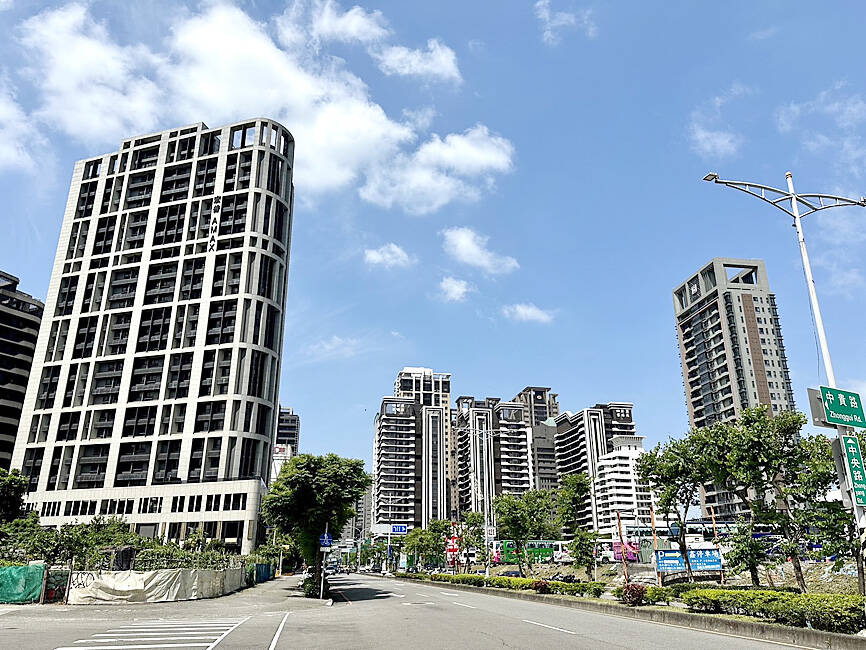Major commercial property transactions in Taiwan were lackluster in the first six months of this year, compared with the strong residential market, due to a high comparison base over the same period last year, property broker Savills Taiwan (第一太平戴維斯) said yesterday.
Commercial property deals of more than NT$300 million (US$9.23 million) totaled NT$65.8 billion in the first half of this year, suggesting a 10 percent retreat from a year earlier, due mainly to an unfavorable comparison base linked to the liquidation sales of buildings owned by a real-estate investment trust (REIT).
The Shin Kong No. 1 REIT (新光一號) sold its six buildings in Taipei for NT$30.7 billion in the second quarter of last year.

Photo: Hsu Yi-ping, Taipei Times
Lingering inflation and restrictive monetary policy helped weigh on the commercial segment of the real-estate market, unlike residential properties that have benefited from favorable lending terms and wealth inflation induced by stock rallies at home and abroad.
Office buildings appeared to be the most in demand, generating NT$23.7 billion of the deals, or 36 percent, Savills Taiwan said.
Tatung Co (大同) sold an old office building in Taipei’s Daan District (大安) for NT$13.13 billion, equivalent to NT$15.26 million per ping (3.3m2) for the land on which the buyer group indicated it plans to build a luxury apartment complex after securing more nearby plots, it said.
Rich Development Inc (力麒建設) sold its headquarters to an institutional buyer for NT$1.28 billion and an individual investor acquired an office building near Yuanshan MRT Station for NT$1.8 billion, it said.
The deals reflected keen interest in existing office buildings by investors seeking future value gains, Savills Taiwan said.
By contrast, corporate buyers prefer presale or newly completed office buildings that can better meet self-occupancy and energy conservation needs, as well as enhance their working efficiency, it added.
Industrial properties are also popular, driving a sizeable NT$17.5 billion of the transactions, the broker said.
I-Hwa Industrial Co (怡華實業) bought an old plant in New Taipei City for NT$3.1 billion, Sigurd UTC Corp (矽格聯測) purchased a used plant in Hsinchu City for NT$1.68 billion and Delta Electronics Co (台達電) acquired two buildings in Taipei’s Neihu District (內湖), it said.
Property developers emerged as the most active buyers, pouring NT$21.3 billion into the commercial property market so far this year, followed by technology firms at NT$16.2 billion, Savills Taiwan said.
Developers are buying old buildings to replenish their land holdings, while semiconductor firms are expanding their research and development capacity as a result of a boom in demand for artificial intelligence products, the broker said.

Intel Corp chief executive officer Lip-Bu Tan (陳立武) is expected to meet with Taiwanese suppliers next month in conjunction with the opening of the Computex Taipei trade show, supply chain sources said on Monday. The visit, the first for Tan to Taiwan since assuming his new post last month, would be aimed at enhancing Intel’s ties with suppliers in Taiwan as he attempts to help turn around the struggling US chipmaker, the sources said. Tan is to hold a banquet to celebrate Intel’s 40-year presence in Taiwan before Computex opens on May 20 and invite dozens of Taiwanese suppliers to exchange views

Application-specific integrated circuit designer Faraday Technology Corp (智原) yesterday said that although revenue this quarter would decline 30 percent from last quarter, it retained its full-year forecast of revenue growth of 100 percent. The company attributed the quarterly drop to a slowdown in customers’ production of chips using Faraday’s advanced packaging technology. The company is still confident about its revenue growth this year, given its strong “design-win” — or the projects it won to help customers design their chips, Faraday president Steve Wang (王國雍) told an online earnings conference. “The design-win this year is better than we expected. We believe we will win

Chizuko Kimura has become the first female sushi chef in the world to win a Michelin star, fulfilling a promise she made to her dying husband to continue his legacy. The 54-year-old Japanese chef regained the Michelin star her late husband, Shunei Kimura, won three years ago for their Sushi Shunei restaurant in Paris. For Shunei Kimura, the star was a dream come true. However, the joy was short-lived. He died from cancer just three months later in June 2022. He was 65. The following year, the restaurant in the heart of Montmartre lost its star rating. Chizuko Kimura insisted that the new star is still down

While China’s leaders use their economic and political might to fight US President Donald Trump’s trade war “to the end,” its army of social media soldiers are embarking on a more humorous campaign online. Trump’s tariff blitz has seen Washington and Beijing impose eye-watering duties on imports from the other, fanning a standoff between the economic superpowers that has sparked global recession fears and sent markets into a tailspin. Trump says his policy is a response to years of being “ripped off” by other countries and aims to bring manufacturing to the US, forcing companies to employ US workers. However, China’s online warriors